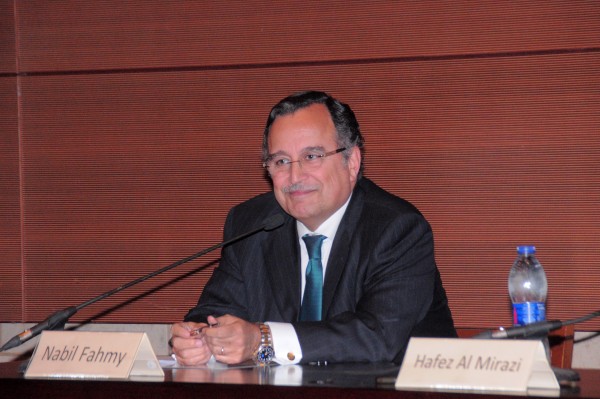By: Engy El Zakazeky
Follow @engy_elzakazeky
Dean of the School of Global Affairs and Public Policy (GAPP) Nabil Fahmy has been confirmed as a member of a foreign policy advisory board for the President of the United Nations General Assembly (UNGA).
As former Foreign Minister, Fahmy has considerable experience in international affairs.
The Caravan sat down with Dean Fahmy to discuss the UN’s role in a region plagued by conflict.
How do you think the Arab-Israeli conflict will be tackled in the near future in the UN?
I don’t see much progress in the near future, specifically because while the basis for the solution is clear based on ‘67 borders, I don’t see the American government is putting enough constructive pressure to achieve that goal.
What are major political concerns affecting the region?
The issue of refugees for example was regionally a Palestinian issue, then it became an Iraqi issue, then it became a Syrian issue and we have seen, as Egyptians, the problem of refugees and migrants passing from Africa through Egypt as a transit area.
So there is a need to look at issues comprehensively and we need to share this responsibility and not put all the blame on the Egyptians. I argue that the international community as a whole has responsibility.
What do you think should be the foreign policy priorities for the UN?
I think there should truly be more global listening to diverse opinions. At the same time, I think it’s extremely important to resolve regional conflicts, preserve global consensus on climate change and on the prevention of the proliferation of nuclear weapons.
What would you personally want to bring to the attention of the UN?
More democratization of international affairs and to truly deal with all states at the UN equally.
The spirit of the UN Charter clearly gives a particular role to the victors of World War II, so I think it’s time now, in 21st century, for the organization to become more
democratic and to resume it’s leading role in conflict resolution. It has tended to leave negotiations and conflict resolution to the major powers.
How do you envision Egyptian-American relations will be in the near future?
I think the Egyptian-American relationship has always had two faces.
Some people believed that it was very good others believe that it’s very bad, depending on who you talk to.
Actually, sometimes it was at the middle, so it was never as good as people think and it was never as bad as others think.
As a former Minister of Foreign Affairs, which country is the most supportive and cooperative with Egypt?
There are many countries that have been supportive to Egypt like the United Arab Emirates, Russia and Saudi Arabia. Many others have had different opinions, but I don’t believe that every difference in opinion is a problem.
So when we have competing interests with other countries it is not at all a problem.
What causes a problem is if either of us takes measures that may affect the international interest of the other country.
What responsibilities will you have after joining the UN?
This an advisory position specifically to provide advice within a small group of about 10 to 12 people to the President of the UNGA this year.
The idea is to provide diverse opinions on global issues and specifically on the achievement of peace, and the role of the General Assembly, which is the congress of nations, in achieving that peace.
So each one will give his advice from his background; for example, I came from political background and now, an academic background.
It’s essentially a moral responsibility. The President has no official obligations.
A common critique of the UN is that it has lost its meaning and credibility as an international institution. How do you respond to that in light of your new role?
It is not difficult to manage an institution that has 193 members. However, it’s very difficult to achieve agreement between all members, but that’s really the name of the game.
We are trying to manage the world, so it cannot be an institution that functions quickly, but the UN is definitely useful in securing peace and developing norms.
